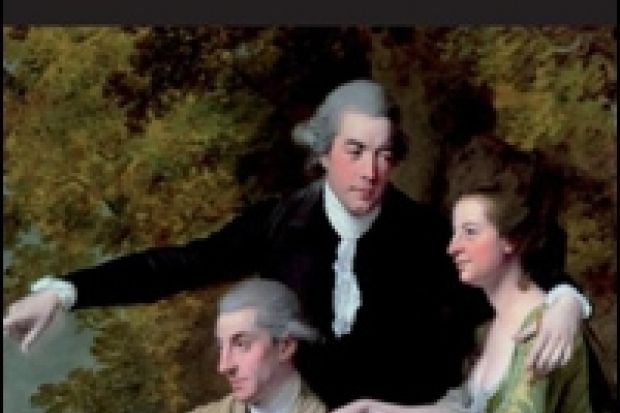This splendid book puts forward as the great discovery of the British Enlightenment "that there is such a thing as society, that humans are principally intelligible as social beings, and that society itself is liable to change". Women were now first accorded both a history of their own and a role in the developing history of the world. That was the good news; the bad news was "the rise of increasingly polarised notions of gender difference" (dependent partly on current theories of anatomy) and a belief in separately gendered spheres of action. Good and bad news are inextricably enmeshed here, and so are warring interpretations of the same processes. The separate-spheres dogma seemed to become more flourishing the farther it diverged from accurate description of the real world: was this because women used it as a stalking horse or men espoused it in backlash?
The introduction alone suffices to show that this is a very unusual book. It presents a detailed and challengingly rigorous account of various issues central to intellectual history - the debate swirling around Bernard Mandeville as to whether virtue springs from moral choice or social conditioning, the nature and the history of "civilisation", and the challenge to Enlightenment concepts of the power of reason and the gradual self-betterment of humanity, first by the rediscovery of the Middle Ages and the glorification of codes of chivalry, and second by the growth of Evangelicalism. It does all this while treating women not solely as the territory fought over by controversialists, but as participants in the controversy.
Such challenging and satisfying history reconstructs and explicates complex intellectual systems, making them comprehensible to us who are 200 years and more divided from them. Today, when the Enlightenment, along with rationality and scientific thinking, function as whipping boys for some of modernity's most obviously damaging habits, it is salutory to read O'Brien's trenchant analysis. She reminds us how fluid, uncodified and contingent such systems of thought were in their heyday, how individual thinkers shaped and reshaped what most ordinary people accepted as givens, and how close is our continuing relation to that very different time. Even those who know some history may be doomed to repeat it. Historian William Robertson expressed indignation at native North American marriage contracts amounting to bride sale, at a time when marriage contracts in Britain were financial deals between father and bridegroom. Just so today, fury is voiced against Afghanistan for thinking of legalising marital rape, by people in Western countries where, until a bare generation ago, such rape had been legal and had never been otherwise.
O'Brien moves effortlessly between male and female writers, between England, Scotland and continental Europe, and between known and obscure names. While focusing on the broad debate about human history and institutions, the book contributes to today's academic conversation about "feminism", from Mary Astell in the 1690s to Mary Wollstonecraft in the 1790s. A crucial development over that century was that "women came to define what was specific and superior about European culture". For Astell and her generation, the Cartesian elevation of rational powers offered a toehold on which to claim equality.
As philosophy came to define the human being less in terms of mind and more in terms of social organisation, women became more central but not more equal. Catharine Macaulay and Mary Wollstonecraft found they had to rewrite the accepted history of civilisation before they could challenge the "cult of chivalric manners", the belief that woman was weak so that man might be not only strong but also generous and forbearing: in a word, civilised. William Alexander could now publish a History of Women (1779) that is really, says O'Brien, "a history of politeness to women". Even the proto-feminist Elizabeth Montagu no longer supposed that the mind had no sex: of Macaulay she wrote, "I hate a woman's mind in men's cloaths."
Centre stage is taken here by Macaulay's philosophical Letters on Education (1780), and by Wollstonecraft's evolving response, from reviewing it when it appeared, to thoroughly assimilating and using it in her Vindication of the Rights of Woman in 1792. I know no better discussion of these two important texts and the relation between them. Its excellence is earned by its thorough grounding in myriad other works: Alexander's History of America, Gilbert Stuart's View of Society in Europe, Jemima Kindersley (hailed here as a disciple of Montesquieu), Susannah Dobson (an early proponent of the idea that history needs cultural history) and many more.
The final chapter reaches onwards, through early 19th-century practitioners of the "history of manners", to John Stuart Mill, Harriet Taylor and the beginnings of the campaign for women's suffrage. It finely exemplifies Sarah Austin's concept of "the great collective life called (a nation's) history".
Women and Enlightenment in Eighteenth-Century Britain
By Karen O'Brien
Cambridge University Press 318pp, £50.00 and £17.99
ISBN 9780521773492 and 47
Published 3 March 2009
Register to continue
Why register?
- Registration is free and only takes a moment
- Once registered, you can read 3 articles a month
- Sign up for our newsletter
Subscribe
Or subscribe for unlimited access to:
- Unlimited access to news, views, insights & reviews
- Digital editions
- Digital access to THE’s university and college rankings analysis
Already registered or a current subscriber? Login
